first are the previous answers after, please answer part 3
temperature change ---> + not -.
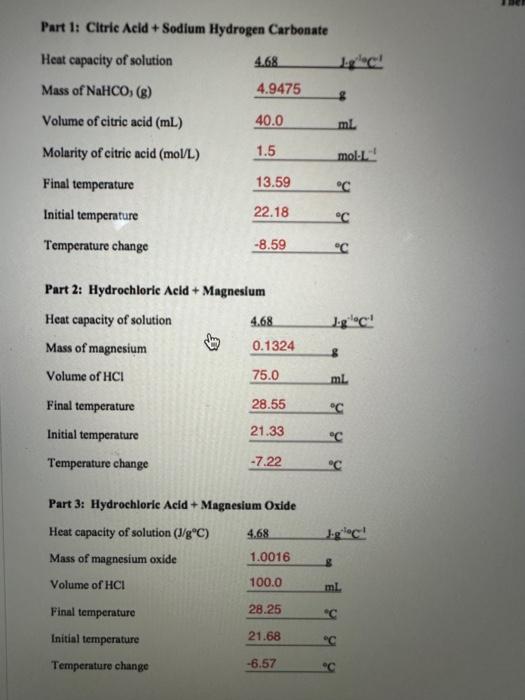
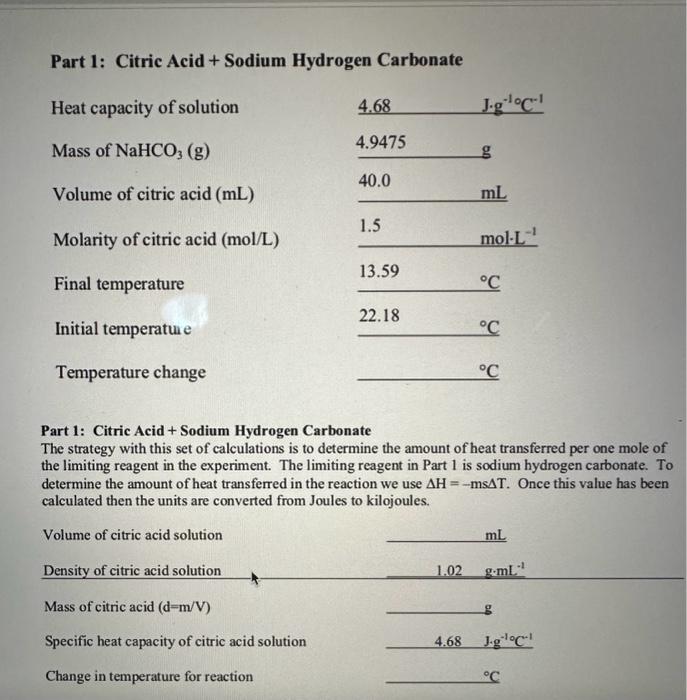
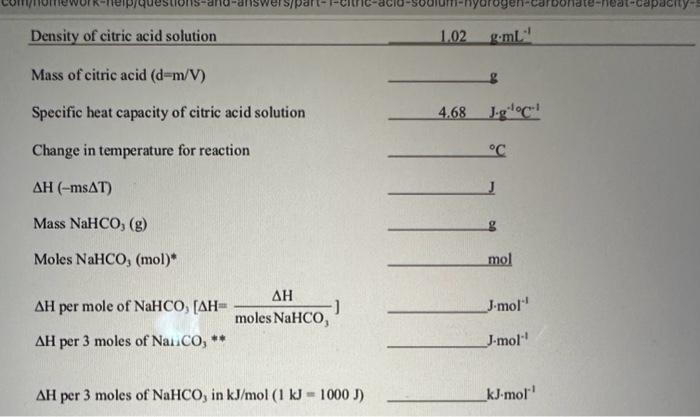
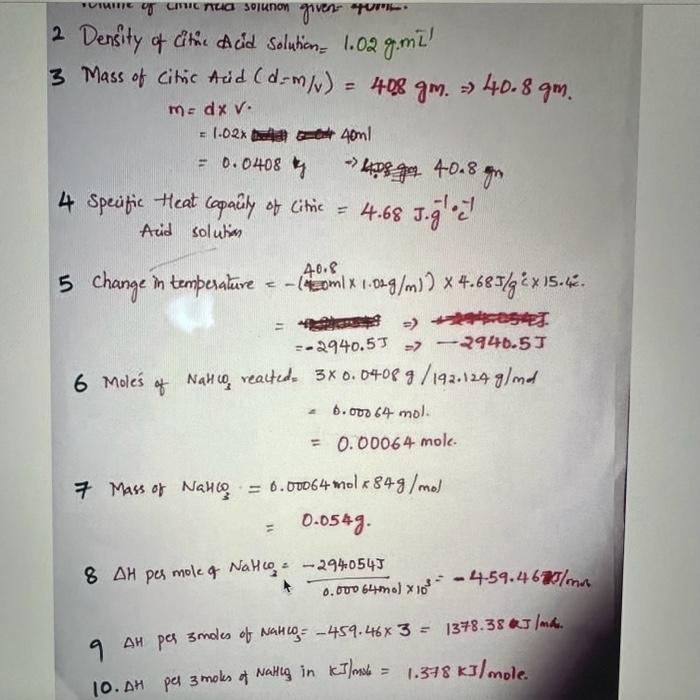 answers are and end here
answers are and end here
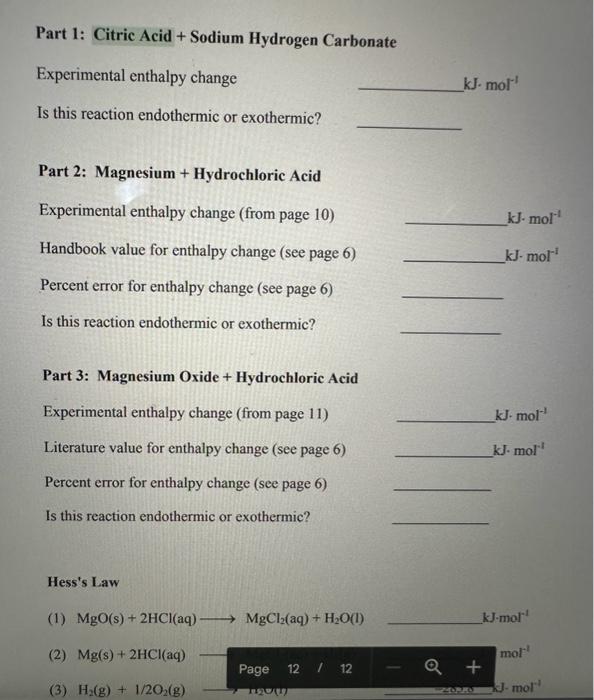
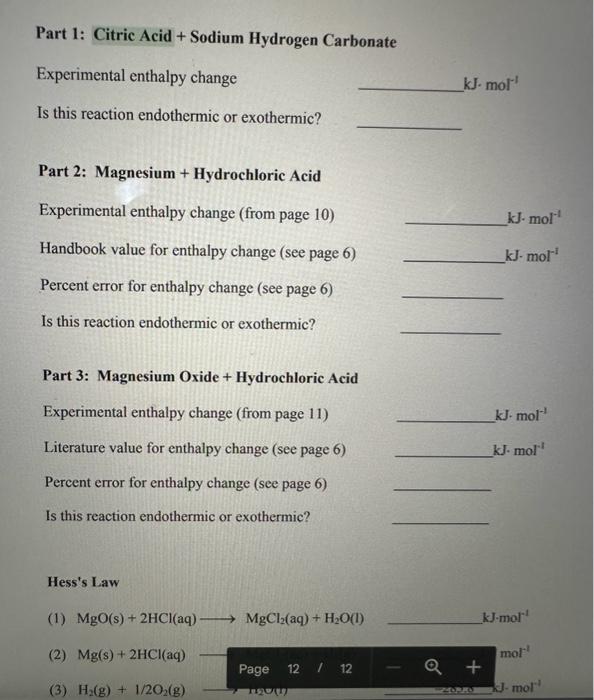
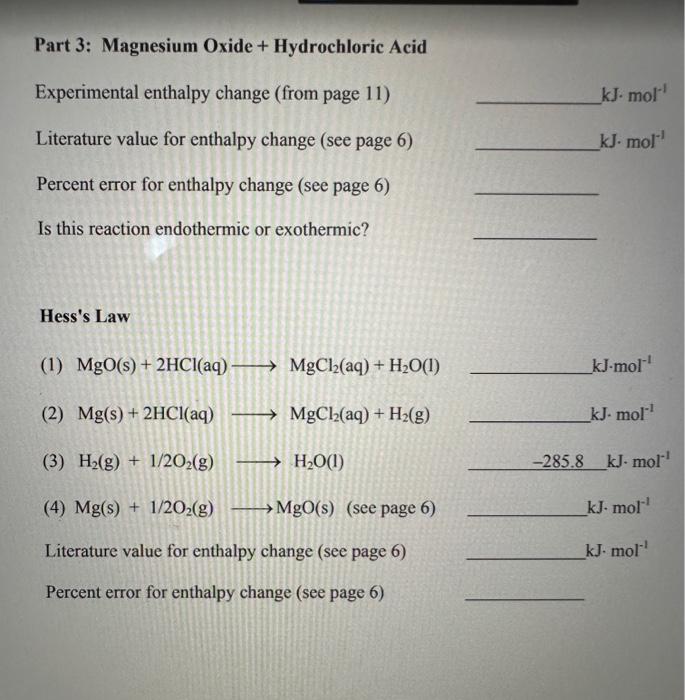 answer these
answer these
Part 1: Cltric Acid + Sodium Hydrogen Carbonate Part 2: Hydrochloric Acid + Magnesium Part 3: Hydrochloric Acid + Magnesium Oxide Part 1: Citric Acid + Sodium Hydrogen Carbonate Part 1: Citric Acid + Sodium Hydrogen Carbonate The strategy with this set of calculations is to determine the amount of heat transferred per one mole of the limiting reagent in the experiment. The limiting reagent in Part 1 is sodium hydrogen carbonate. To determine the amount of heat transferred in the reaction we use H=msT. Once this value has been calculated then the units are converted from Joules to kilojoules. Density of citric acid solution 1.02gmL1 Mass of citric acid (d=m/V) Specific heat capacity of citric acid solution 4.68Jg10C1 Change in temperature for reaction H(msT) Mass NaHCO3(g) Moles NaHCO3(mol) mol H per mole of NaHCO3[H=molesNaHCO3H]Jmol1 H per 3 moles of NaniCO3Jmol1 H per 3 moles of NaHCO3 in kJ/mol(1kJ=1000J) kJJolm1 Density of cithic Acid Solution =1.02gmL Mass of citic Acid (d=m/v)=40ggm.40.8gm. m=dv.=1.020ml=0.0408tg40.8gn 4 Specific Heat copauily of citric =4.68JJ1C1 Acid solution 5 Change in temperature =(4=0.8m11.02g/m))4.68J/gC15.4. =2940.5J2946.5J 6 moles of NaHlO3 reacted =30.0408g/192.124gd - 6.00064mol. =0.00064 mole. 7 Mass or NaHCCO3=0.00064mol84g/mol =0.054g. 9H per 3 moles of NaH3=459.463=1378.38kJ/mat. 10. H per 3 mokes of NaHllg in kJ/mos=1.378kJ/mole. Part 1: Citric Acid + Sodium Hydrogen Carbonate Experimental enthalpy change kJkolmol1 Is this reaction endothermic or exothermic? Part 2: Magnesium + Hydrochloric Acid Experimental enthalpy change (from page 10) kJmol1 Handbook value for enthalpy change (see page 6) kJmol1 Percent error for enthalpy change (see page 6) Is this reaction endothermic or exothermic? Part 3: Magnesium Oxide + Hydrochloric Acid Experimental enthalpy change (from page 11) kJJmol1 Literature value for enthalpy change (see page 6) kJJol Percent error for enthalpy change (see page 6 ) Is this reaction endothermic or exothermic? Hess's Law (1) MgO(s)+2HCl(aq)MgCl2(aq)+H2O(l) kJmol1 Part 1: Citric Acid + Sodium Hydrogen Carbonate Experimental enthalpy change kJkolmol1 Is this reaction endothermic or exothermic? Part 2: Magnesium + Hydrochloric Acid Experimental enthalpy change (from page 10) kJmol1 Handbook value for enthalpy change (see page 6) kJmol1 Percent error for enthalpy change (see page 6) Is this reaction endothermic or exothermic? Part 3: Magnesium Oxide + Hydrochloric Acid Experimental enthalpy change (from page 11) kJJmol1 Literature value for enthalpy change (see page 6) kJJol Percent error for enthalpy change (see page 6 ) Is this reaction endothermic or exothermic? Hess's Law (1) MgO(s)+2HCl(aq)MgCl2(aq)+H2O(l) kJmol1 Part 3: Magnesium Oxide + Hydrochloric Acid Experimental enthalpy change (from page 11) kJmol1 Literature value for enthalpy change (see page 6 ) kJmol1 Percent error for enthalpy change (see page 6) Is this reaction endothermic or exothermic? Hess's Law (1) MgO(s)+2HCl(aq)MgCl2 (aq) +H2O (l) kJmol1 (2) Mg(s)+2HCl(aq)MgCl2(aq)+H2(g) kJmolmol1 (3) H2(g)+1/2O2(g)H2O(l)285.8kJmol1 (4) Mg(s)+1/2O2(g)MgO (s) (see page 6) kJmol1 Literature value for enthalpy change (see page 6) kJmol1 Percent error for enthalpy change (see page 6)



 answers are and end here
answers are and end here

 answer these
answer these





